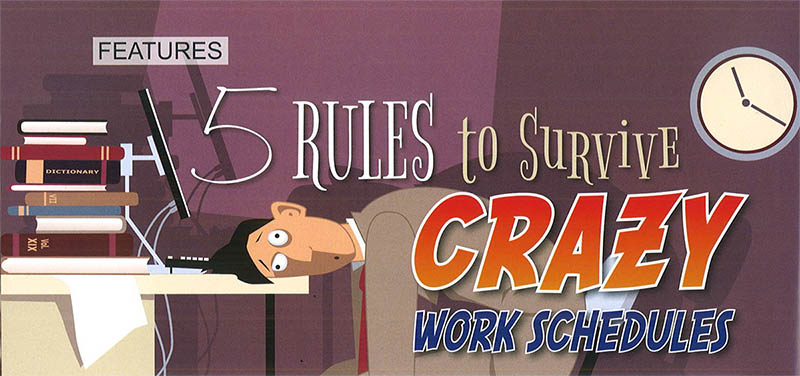Press
4th Issue 2016 - 5 Rules to Survive Crazy Work Schedules - TODAY'S MANAGER
01 December 2016 by Emma

Long work hour weeks, deadlines, and increasing pressures are commonplace in today’s workplaces. Here are five tips that let us control our work and avoid letting it control us.
The pace of life today demands a survival of the fittest. Erratic work schedules with long work hours can deplete a person’s physical and mental vigour. In a competitive business environment, challenging times demand fit, agile and proactive executives. It is the age of the smart workforce and the reign of the millennial generation who will soon comprise a majority of the workforce of the future.
Findings from the latest Ministry of Manpower (MOM)’s quarterly Labour Market report shows that Singapore retains its number one spot for the longest working hours in the world. According to the Ministry of Manpower (MOM) statistics, 1Singaporeans work an average of 45.5 hours a week in 2015. Yet, despite the long hours, Singapore had one of the lower levels of gross domestic product (GDP) per hour worked. 2
With the global talent crunch, and Singapore being a country with a limited talent pool, it is no secret that employees in Singapore are required to put in extra hours at work to drive the economy and sustain their lifestyles. If the workforce gives up and fails to commit to work commitments, perhaps the lower-skilled jobs will be be replaced by automation and robots.
This places greater pressure on the Singaporean workforce to strive harder and be smarter about surviving in these competitive times. Findings highlighted by the States Times Review 3 reported that Singapore had an average of 2,389.4 hours in 2014. This was followed by Taiwan (2,163 hours), Japan (1,735 hours) and South Korea (2,193 hours) in 2014-15.
Crazy hectic schedules impact work-life balance, can leave you frustrated, irritated and burnt-out. So how can a person survive long work hour weeks, deadlines and increasing pressures without losing his/her nerve? Here are five rules to help you survive:
Rule 1: Do Not Take In More Than You Can Chew
This means saying ‘No’ when you know you cannot commit to deadlines at work. People often overcommit to deadlines and end up feeling burnt-out and stressed too easily.
The ground rule to maintaining work efficiency and maximising productivity levels is to always keep the balancing act intact. Don’t be afraid to say no to your friends and colleagues, if you need time to catch up on work. This gives you some room to manoeuvre and free up time for yourself to unwind and relax after work.
Rule 2: Manage Time Effectively
Time management is an art and a skill. Make a schedule and stick to the agenda. Keep track of your day and avoid procrastinating. Stick to the schedule and ensure that your tasks are completed within a given timeframe. It can be gratifying to finish them within the timeframes you set and mark them off the list. It is important to manage time right from the start, to maintain a careful work-life balance and make time for things that you love doing besides work. If you can, try to allocate a part of the day or week (“me” time) to pursue your hobbies and interests.
It can be tempting to take a break to socialise and hang out with friends when you are tied up with work and have to bring some home over weekends. If you lose track of time in the process, and show up late to the office the next day, it piles up again. So be sure to follow a consistent approach towards your work.
Rule 3: Learn to Prioritise and Make a To-Do List
The sooner you learn to prioritise, the better it works for you. When everything seems to be urgent and immediate, learn to prioritise and buy time whenever you can. No amount of passion towards your job will help if you are feeling exhausted, grumpy and suffer from burnt out. Avoiding burnout is essential to job satisfaction and excelling in your career.
Prioritising helps to free up time for family and friends over the weekends; and recharges you for the new work week. This will in the long-run help you to improve your physical and mental well-being.
Only when you are fit, can you survive and scale new heights of excellence in your career. So always prioritise and avoid overcommitting yourself (going by Rule No. 1). We all have limitations, capacities, and core competencies. Learn to make the most of your strengths rather than focus on your weaknesses.
Rule 4: Do Not Push Yourself Too Hard and Stretch Beyond Limits
Do not be too hard on yourself nor push yourself over the edge. Take a cautious approach towards the career stream you wish to pursue and make sure it suits your lifestyle.
Sometimes, working extra hours and taking on new and challenging projects can seem tempting. However, take a deep breath, pause, think and decide if you can rise to the occasion and fulfil those commitments.
Be realistic about the bandwidths you can expand and how much you can stretch to accomplish results. Setting unattainable goals will most definitely lead to disappointment, discontentment, disgruntlement, and lower productivity.
Reward yourself after successfully completing a project/task. While we all face stressful times at work, remember to control your work and avoid letting it control you. Smile especially on hectic days. This will preserve your happy state of mind and help you perform better.
Success is a moving target. Once an objective is met, you flag another objective and the pursuit for excellence and perfection continues. Our moods change. The way we feel on good days and the happiness derived from successfully completing a project are fleeting at best. Hence, it is important to cultivate a “happiness mindset” at work to be more productive and successful.
Rule 5: Breathe Easy to Avoid Feeling Stressed Out
Meditation works wonders, and breathing easy is a simple way to de-stress. Calm your mind and do not allow disruptions to upset your mental framework and disturb you. Learn to focus on task at hand and transform your relationship with stress by practising mental exercises at your desk. Going for long walks and avoiding gossips will help you gain greater clarity at work.
Look at stress as a driver for growth and not as a hindrance to success. Change your attitude towards stress and take each day as a new learning experience.
Deadlines and stress are a part of work life. So one must always be ready to adapt, train, learn and unlearn new skills. However, the key to excellence in one’s personal and professional life lies in how well a person learns to mitigate stress and nudge their brain to think positive.
No matter how busy your days are, embed a snoozing routine in your hectic schedule. This will let your body know it is time to power down and get some rest. A good night’s sleep restores your energy and could help you turn an ordinary work day into a productive one.
References
1 Ministry of Manpower, 13 June 2016, Summary Table: Hours Worked, http://stats.mom.gov.sg/Pages/Hours-Worked_Summary-Table.aspx.
2 BLS, 7 November 2012, International Comparisons of GDP per Capita and per Hour, 1960-2011, http://www.bls.gov/fls/intl_gdp_capita_gdp_hour.pdf.
3 States Times Review, 16 June 2015m Singapore maintains its no 1 ranking in longest working hours in the world, http://statestimesreview.com/2015/06/16/singapore-maintains-its-no-1-ranking-in-longest-working-hours-in-the-world/.
Author
 Mr Ben Chew is a serial entrepreneur with 15 years experience in the HR/recruitment space. He currently has several HR tech projects, including a successful boutique recruitment business – TBC HR Consulting which is based in Singapore. He is also the managing director of Strategia Ventures and is involved in many community initiatives in the local startup ecosystem, including Startup Jobs Asia.
Mr Ben Chew is a serial entrepreneur with 15 years experience in the HR/recruitment space. He currently has several HR tech projects, including a successful boutique recruitment business – TBC HR Consulting which is based in Singapore. He is also the managing director of Strategia Ventures and is involved in many community initiatives in the local startup ecosystem, including Startup Jobs Asia.
Article published in TODAY'S Manager (4th Issue 2016) - PRINT



